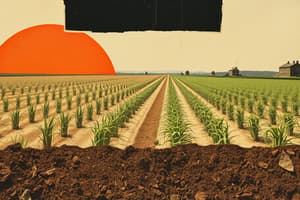Podcast
Questions and Answers
What is a key benefit of proper soil preparation for crop yield?
What is a key benefit of proper soil preparation for crop yield?
- Maximizing input costs
- Reducing the need for irrigation
- Increasing weed growth
- Enhancing nutrient uptake (correct)
Which practice is crucial for optimizing seed germination and reducing weed growth?
Which practice is crucial for optimizing seed germination and reducing weed growth?
- Ploughing
- Irrigating
- Harrowing (correct)
- Harvesting
What is a common technique for enriching the soil during soil preparation?
What is a common technique for enriching the soil during soil preparation?
- Manuring with animal waste (correct)
- Applying chemical pesticides
- Irrigating with saline water
- Using synthetic seeds
Why is choosing good-quality seeds important in planting techniques?
Why is choosing good-quality seeds important in planting techniques?
What should growers consider during the initial stages of plant growth to prevent competition for resources?
What should growers consider during the initial stages of plant growth to prevent competition for resources?
What is a common method used to assist seed germination during planting?
What is a common method used to assist seed germination during planting?
Which factor is essential for seeds to have proper contact with during planting?
Which factor is essential for seeds to have proper contact with during planting?
Which irrigation systems are mentioned as more efficient than flood irrigation?
Which irrigation systems are mentioned as more efficient than flood irrigation?
What methods can be combined in Integrated Pest Management (IPM) practices?
What methods can be combined in Integrated Pest Management (IPM) practices?
What is the purpose of threshing in harvesting practices?
What is the purpose of threshing in harvesting practices?
Which factor is essential to ensure that grain retains its quality and is protected against insect infestations?
Which factor is essential to ensure that grain retains its quality and is protected against insect infestations?
What can help manage pest populations without heavy reliance on pesticides according to the text?
What can help manage pest populations without heavy reliance on pesticides according to the text?
Flashcards are hidden until you start studying
Study Notes
Crop Production and Management: Key Strategies for Maximum Output and Efficiency
Introduction
Crop production refers to the process of cultivating crops for both human consumption and commercial use. The goal of crop management is to optimize all inputs such as soil, seed, manure, fertilizer, water, harvesting, and storage to improve productivity while minimizing input costs. Effective farm management practices are crucial in the face of growing global population demands and limited resources. This article will explore key strategies for efficient crop production and management, focusing on soil preparation, planting techniques, irrigation methods, pest control, and harvesting practices.
Soil Preparation
Proper soil preparation is essential for a successful crop yield. Key techniques include ploughing or tilling to loosen the soil and improve air penetration, harrowing to smooth out uneven surfaces, levelling to create uniform land, and manuring with organic matter like animal waste or compost to enrich the soil. A well-prepared seedbed can optimize seed germination, enhance nutrient uptake, and reduce weed growth, leading to better overall crop health and quality.
Planting Techniques
Choosing the right seeds and planting them at appropriate depths and spacing is crucial. Good-quality, healthy seeds should be used, and they should have good contact with the soil for proper germination. Seeds may need treatment with chemicals to assist in germination. Weed control should also be considered during the initial stages of plant growth to prevent competition for resources. Adequate moisture levels are necessary for effective plant growth and nutrient absorption.
Irrigation Methods
Water management plays a significant role in crop production. Efficient irrigation systems should be chosen based on crop requirements and local water availability. Micro-sprinklers, low-elevation sprinklers, drip irrigation, and low- and high-pressure center pivots are more efficient than flood irrigation. Scheduling irrigations during early morning or late evening reduces evaporation losses. Over-irrigation should be avoided to avoid nutrient leaching into groundwater and soil erosion via surface runoff.
Pest Control
Integrated pest management (IPM) practices combine mechanical, biological, and chemical methods to control pests effectively. Rotating crops, using companion plants, and employing natural predators can help manage pest populations without relying heavily on pesticides. Using diverse cropping systems can decrease the likelihood of widespread crop failures and pest pressure. Monitoring crops regularly allows farmers to address specific needs promptly.
Harvesting Practices
Harvesting involves cutting crops after they reach maturity. Mechanical or manual methods can be used, depending on the crop type. Threshing separates grains from chaff, with equipment like sickles or combines serving this purpose. Proper drying and storage techniques ensure that grain retains its quality and is protected against insect infestations. Marketing strategies should consider both private and central government agencies to sell produce efficiently.
In conclusion, adopting best agricultural practices can lead to increased crop yields and improved efficiency. By focusing on soil preparation, planting techniques, irrigation methods, pest control, and harvesting practices, growers can maximize their output while maintaining sustainability.
Studying That Suits You
Use AI to generate personalized quizzes and flashcards to suit your learning preferences.




